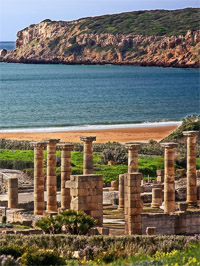 |
Spain | Travel | Regions | Cities | Coasts | Islands | Culture |
| Spain / Andalusia / Costa de la Luz / Cadiz / Playa de Bolonia: "Baelo Claudia" |
|
| More Information | ||
| Destinations in Cadiz | ||
| Plan your Trip | ||
| ||||||
 The beach of "Bolonia" belongs to the municipality of Tarifa. Just like Zahara de los Atunes, "Playa de Bolonia" has been since the '70s a favourite beach
The beach of "Bolonia" belongs to the municipality of Tarifa. Just like Zahara de los Atunes, "Playa de Bolonia" has been since the '70s a favourite beach Next to the beach and only a few meters from the sea there are as well the fascinating Roman ruins of the town of Baelo Claudia. This is a second-century a.C. Roman city built over a still older Phoenician-Punic settlement. Baelo Claudia was at this time the main seaport of the area. The town was quite wealthy due to fishing, the production of salted fish and because there was an acknowledged manufactory of "garum" or "liquamen" (a fish sauce which was very appreciated by the Romans). At no other site in Spain it is possible to get such a complete vision of Roman urbanism. There was a town-wall with more than forty towers, of which the three main gates are preserved, there were administrative buildings including the Curia and the municipal archive, a public square (or forum), a courthouse, and four temples dedicated to Jupiter, Juno, Minerva and the Egyptian goddess Isis, respectively. We can still see the remains of shops, markets, thermal baths and the theatre, roads, aqueducts, and the industrial area where the "garum" was manufactured. |